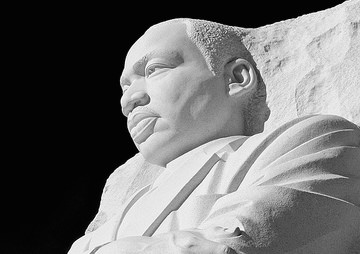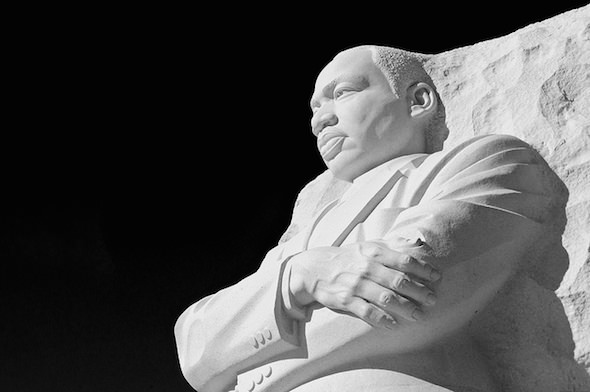Memory of Martin Luther King Is Distorted, Professor Argues
The "Commemorative King," the "Therapeutic King," the "Conservative King" and the "Commodified King." Each of them “competes for our attention," though they represent a vision of the man that “he himself would not have recognized,” writes history professor Thomas J. Sugrue.

InSapphoWeTrust / CC BY-SA 2.0
“There is probably no figure in recent American history whose memory is more distorted, whose message is more bowdlerized, whose powerful words are more drained of content than King,” argues University of Pennsylvania history professor Thomas J. Sugrue at Jacobin magazine.
A few years ago, in preparation for a public lecture on 1968, I reread the most important book on King and his politics to come out in the last decade: Thomas F. Jackson’s From Civil Rights to Human Rights: Martin Luther King Jr and the Struggle for Economic Justice. Jackson, a former researcher with the King Papers project at Stanford, has read King’s every last sermon, speech, book, article, and letter. What Jackson finds is that from the beginning of his ministry, King was far more radical, especially on matters of labor, poverty, and economic justice, than we remember. […]
Through a close reading of King’s work, Jackson finds deep currents of anti-imperialism running through King’s thought, going all the way back to his days as a student. He finds a consistent thread of anticapitalism in King’s speeches. And he finds that King was building alliances with the left wing of the labor movement and allying himself with activists who called for structural change in the economy. King, in other words, was a radical well before he offered his prophetic denunciation of the Vietnam War in 1967 or joined the Memphis sanitation workers on strike in 1968.
King’s radicalism is lost to the obfuscating fog of memory. In American culture today, we have several Martin Luther King Jr’s: the Commemorative King, the Therapeutic King, the Conservative King, and the Commodified King. Each of these Kings competes for our attention, but each of them represents a vision of King that he himself would not have recognized.
The “Therapeutic King” Sugrue recognizes as follows:
[I]n American iconography, King is the great healer, the man who called America to be true to its “creed” of equality and opportunity. King’s message, bereft of its hard-hitting political content, is so anodyne that we can all support it, Republican and Democrat alike. The inspirational message of King’s life has moved front and center in our memories of King. A popular school curriculum intended to build student self-esteem, for example, calls for children to express their dreams. King’s message is to hold hands and join our voices together, ebony and ivory, in perfect harmony.
“The conservative King,” Sugrue adds, “is based on a very selective appropriation of King’s words—largely from a single speech—in service of a cause that King found abhorrent. And the commodified King creates comforting images that are wholly drained of their ability to provoke and challenge—and, moreover, stand in sharp juxtaposition to King’s penetrating critique of American capitalism and his deep-rooted anti-materialism.”
Continue reading here.
— Posted by Alexander Reed Kelly.
Independent journalism is under threat and overshadowed by heavily funded mainstream media.
You can help level the playing field. Become a member.
Your tax-deductible contribution keeps us digging beneath the headlines to give you thought-provoking, investigative reporting and analysis that unearths what's really happening- without compromise.
Give today to support our courageous, independent journalists.






You need to be a supporter to comment.
There are currently no responses to this article.
Be the first to respond.